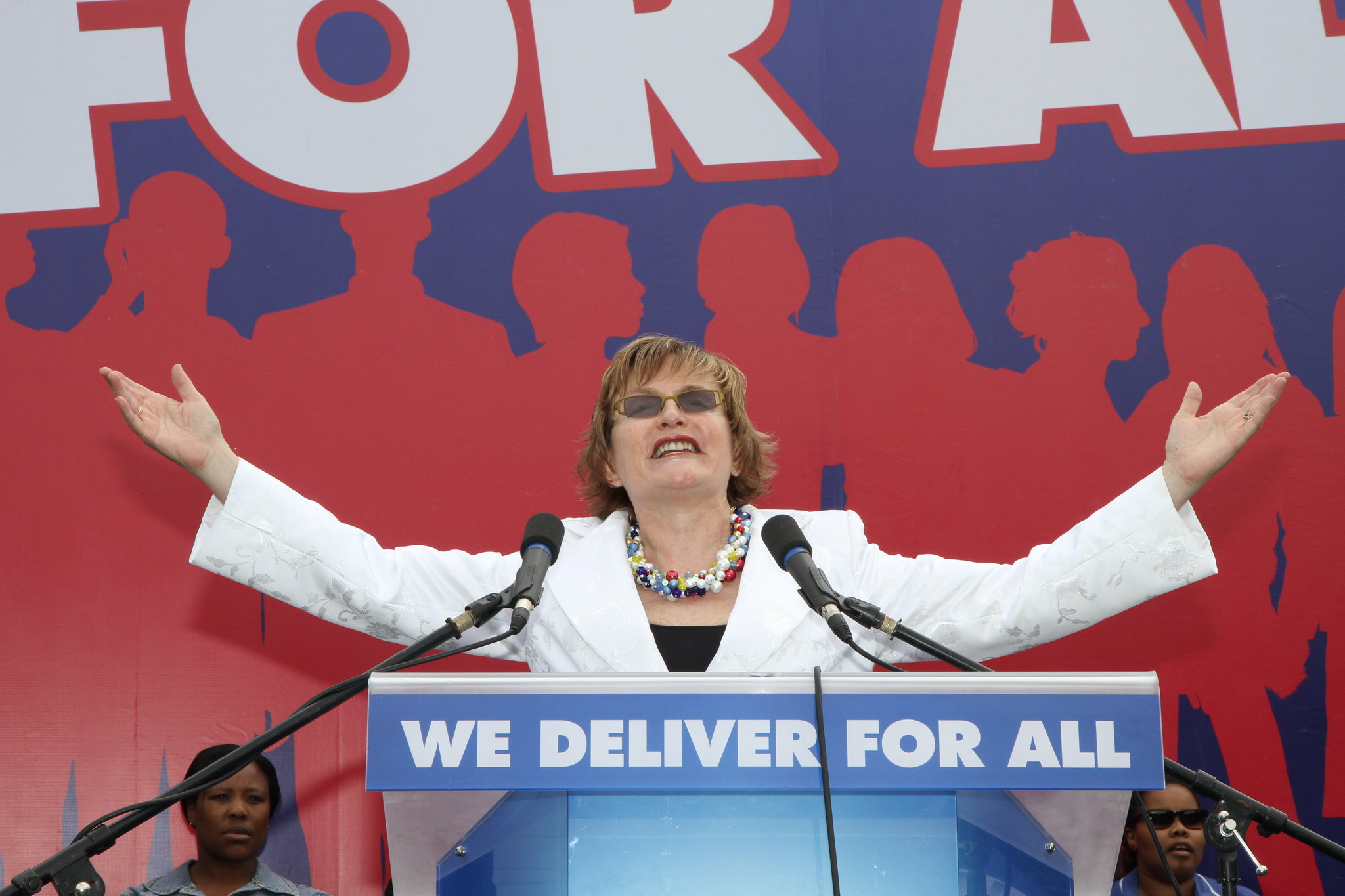Helen Zille’s transphobia
In echoing the anti-trans panic sweeping the Global North, South African political heavyweight Helen Zille joins a reactionary tradition of racialized sex policing.

Helen Zille, at a Freedom Day Rally in Mamelodi, Tshwane. Image via Democratic Alliance on Flickr CC BY-SA 2.0.
Helen Zille has been spewing vitriol on X again, and this time her target is trans people. Her tweet comes following the UK ruling to limit the definition of sex to a binary assigned at birth. Zille celebrated alongside prominent “gender-critical” figures like JK Rowling, tweeting: “They have protected the rights of women across the English-speaking world from a contagion as dangerous, socially, as Covid was, medically.”
Several South African queer organizations (including the Triangle Project, African Trans Network, and Gender Dynamix) voiced condemnation, calling for a public apology and for the Democratic Alliance to take disciplinary action. Many warn that Zille’s public status may galvanize support for views that endanger trans South Africans already disproportionately vulnerable to violence and stigma. Indeed, the fringe gender-critical group First Do No Harm SA quickly released their own statement thanking Zille for her “courage” because, “until now FDHNSA has been the only voice speaking out …” about the ‘fact’ that sex “cannot be changed.”
It’s not the first time that Zille, current chairperson of the DA’s Federal Council, has come under fire for her comments online. Perhaps most infamously, in 2017, she faced disciplinary action after tweeting that colonialism was “not ONLY negative.” More recently, in 2023, she received backlash for a prior instance of transphobia.
In light of the rapidly growing moral and legal panic around transgender rights in the Global North, Zille’s comments cannot be dismissed as simply an offshoot of reactionary thought. Rather, they illuminate the disturbing alliance between the anti-gender movement and colonial white supremacy. Whether intentional or not, her comments rest on a history of policing sex and gender in the service of colonial domination. Certainly, the dubious language of her tweet raises an eyebrow: when she says “the English-speaking world,” to whom exactly is Zille referring?
Binary sex was enforced by colonial powers to establish racial hierarchy. Knowledge regimes that were part myth-making and part pseudo-science claimed that the more “civilized” a group was, the greater the difference between male and female. In Southern Africa in particular, this idea was manipulated to prove the “superiority” of whiteness by claiming that intersexuality was more common among Africans.
This trope of the sexually ambiguous African was promoted just as the existence of sex diversity among Europeans was being increasingly “corrected” by surgical intervention. To be sure, modes of controlling sex were violent against all trans and intersex people, but they were meted out differently based on race. Colonial scientists and doctors produced a slew of deeply biased texts to back up claims that black bodies were “naturally” more sexually non-normative. Meanwhile, in Europe, invasive surgeries were increasingly performed on white intersex children. While black and brown children were marked as already “unfixable” by their race, white children were positioned as “at risk,” and in need of “protection” through “correcting” their sex into a male/female binary.
Decrying the abuse of “vulnerable children” and (cis) women is an emotional flashpoint all too commonly deployed by the gender-critical movement. Zille, too, echoes such sentiments in her Facebook follow-up to the offending tweet, writing that “the greatest danger has been posed to vulnerable tweens, teens and adolescents.” While it is seldom explicitly stated that this refers to white children, it remains uncanny that the gender critical feminist brigade that Zille has aligned herself with comprises a majority of Global North white women—who insist that their phobic diatribe is about protecting women and children’s “rights” and a “common sense” sex binary. It is tempting to point out that British colonizers, too, claimed to be “protecting” both “women” and “rationality,” both narrowly defined.
The apartheid regime exercised its own racialised controls over binary sex. In 1974, the National Party legalized the change of sex for individuals who had undergone surgery. While this may seem surprising, it granted the state power over designating the “correct” sex to (mostly white) individuals who had undergone what they deemed sufficient medical processes. It is also significant that gender-affirming surgery at the time was largely employed to “cure” homosexuality. This raises the question: if legal recognition is not new, is the problem with trans existence itself, or with greater self-determination?
While the gender-criticals might not explicitly say “white” women and “white” children, they don’t need to: their nostalgia for a fictitious past of “untainted” binary sex is glaringly resonant with colonial discourse.
For now, Zille seems unsatisfied with the relative lack of uptake of transphobic discourse by South African state actors. However, while a public apology is a start, it is not enough, nor is characterizing “GogoZille” (as she is sometimes playfully referred to) as an individual bad egg.
We must be proactive to prevent the anti-gender movement from gaining more traction on South African soil, and strengthen alliances between African and transnational groups who have been resisting the transphobic moral panic since even before it blew up in the US and UK. Let us reject the divisive rhetoric that seeks to split the “LGB” from the “TQI+.” The struggles of sex- and gender-diverse minorities in Africa have been intertwined since long before the coining of the terms transgender or intersex.
Zille’s tweets hail an opportunity for South Africans to let our actions speak as loudly as our international “LGBTQI+-friendly” reputation does. If there is an exceptionalism we should lean into, it is this: white supremacy and its bedfellow transphobia should have no home in South Africa.



